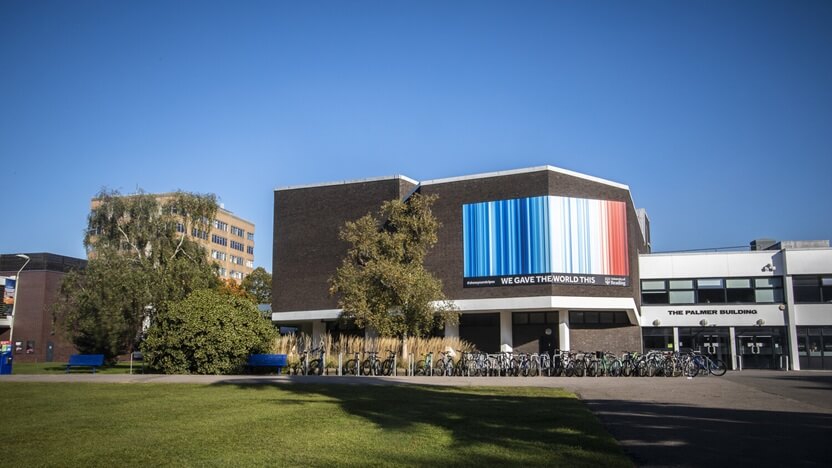Environmental sustainability is at the forefront of everything we do at the University of Reading. It’s one of our key strategic drivers, and we remain firmly committed to our institution wide approach to embedding sustainability across all of our activities. This ranges from ensuring that sustainable development principles are rooted throughout our teaching and research, that our research develops lasting solutions and that we spread our impact effectively across all spheres from local to global. Our latest Environmental Sustainability Report 2024/25 outlines the progress we have made.

Environmental Sustainability Report highlights
This report highlights the following areas of significant progress:
- Sustainable University of the Year 2025 in The Times and The Sunday Times Good University Guide 2025.
- 4th place ranking in the People and Planet University league which demonstrates our institution-wide commitment and third year in the top 5 of this league.
- Top 50 in the world for our work in three of the United Nations Sustainable Development Goals (Times Higher Education Global Impact Rankings 2025).
- Joint 50th in THE Global Impact Rankings 2025.
- Awarded Fairtrade university three-star status, one of only two UK universities with this accolade.
- Winner of 15 consecutive Green Flag awards for Whiteknights campus.
Key areas of progress
Together with a wide range of other topics, our Report details the steps we’ve taken across four key areas and how they contribute towards the United Nations' Sustainable Development Goals (SDGs).

Ethical Investment
Zero direct or indirect investments in fossil fuels
In 2020 we committed to divest from companies directly involved with the extraction of fossil fuels. In 2024 we went one step further and amended our Investment Policy to exclude the largest fossil fuel extraction funders. We disposed of our holdings in Bank of America, Barclays and Wells Fargo.
In 2025, the University significantly expanded the Investment Policy to clarify its investment aims, and how it uses the portfolios to support academic activity and the University’s wider strategy, which includes community engagement. It was also the first full year of exclusion of the biggest fossil fuel funders as identified in the BOCC data set.
The University also amended its policy to create a much clearer means for non-student stakeholders, such as staff members, to raise concerns with Investments and Development Committee.

Waste
63.9% of our waste is sent for recycling, composting, reuse or repair
The University of Reading is ranked 9th worldwide for responsible consumption and production (THE Global Impact Rankings 2025).
Our Waste and Resource Use Strategy focuses on responsible resource use and sustainable waste management – wherever possible, we seek to reduce, re-use, recycle, and recover.
Our efforts are paying off: this academic year, 99% of the University’s operational waste was diverted from landfill, and we achieved a 63.9% recycling rate.

Biodiversity
Winner of 15 consecutive Green Flag Awards
Whiteknights, our main campus, features 120 hectares of woodland, biodiverse grassland, and a lake – and is home to more than 2,000 species of plant and animal life.
Enhancing and conserving the rich biodiversity of our green spaces is critical. To this end, we:
- Completed a comprehensive baseline ecological assessment of our Whiteknights campus. This will inform a new Biodiversity Action Plan.
- We collaborated with local schools to create a number of outdoor learning spaces on the University owned Langley Mead nature reserve.

Education for Sustainable Development (ESD)
Among top 30 global universities for work in five of the 17 SDGs
As educators, we have a responsibility to equip our University community with the skills and knowledge needed to develop sustainable practices – both now and into the future. We are working to ensure that ESD is embedded within all subjects at the University, but experienced in a way that is authentic to the particular discipline.
In early 2025, the University of Reading launched the Global Sustainability Leaders Scholarship programme. This significant investment over the next five years will see up to 400 scholarships per year, each offering £6,000 per year of study, to high performing undergraduates across all disciplines who show a commitment to becoming future sustainability leaders.

Sustainable food
Using technology to reduce gas use
Park Eat, our largest site for food and drink, is now fossil fuel-free, with all cooking and heating powered solely by electricity. Our expertise in this area is being applied to the University Street Food Market, where we are supporting traders switching from gas to electric, as well as introducing the disposable packaging tax to encourage customers to bring their own containers.
Two electric mobile kitchens have been added to the Catering operation, allowing us to begin phasing out BBQs, eliminate gas usage, and better manage food waste through being able to prepare/cook as needed.
Future commitments
While we celebrate our progress, we recognise there is still much to do and we commit to a process of continual improvement to achieve our commitments.
Some key targets include:
- By 2026, be recognised as a leading UK University for sustainability, by consistently achieving a top 5 position in People & Planet University Green League.
- By 2030, aims to be recognised globally as a leading university for climate and sustainability by consistently achieving top 25 positions in global sustainability rankings, such as THE Global Impact Ranking and QS Sustainability Ranking.
Details of our other commitments and ambitions can be found in our Environmental Sustainability Report 2024/25.


